Crossover to PPE saves Lazuri Apparel garment company
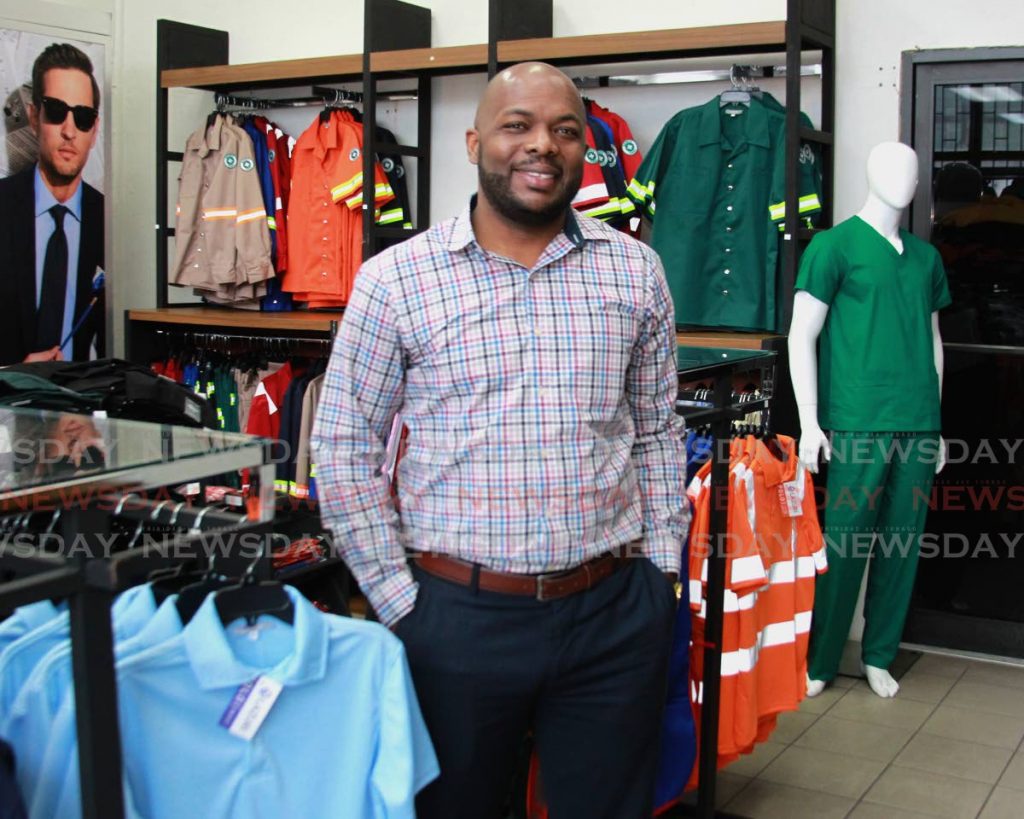
It's no secret that it's been a difficult year for business. For businessman Roger Roach, his ability to refocus and bank on the silver lining of every dark cloud has kept his company afloat.
Roach is the CEO of Lazuri Apparel, a garment factory at 147 Eastern Main Road, Barataria.
“It's easy to get distracted, to get caught up in covid19, vaccines confusion, crime, and unemployment," Roach told Business Day during a recent interview. "Whether I think about it or not, it will still be happening. But I can't let that affect what I'm doing in my business.”

Lazuri specialises in corporate wear. Roach founded the company in 2017 but, surprisingly, he had no experience in garment manufacturing and he had never sat behind a sewing machine. He did have a background in management and experience in his family’s business which was enough to help him build the business from the ground up, into what is now one of the top garment factories in the country.
Roach began as a management trainee and worked his way up to CEO at Langston Roach Industries, one of the Caribbean's leading consumer goods manufacturers and distributor of household, personal care, and janitorial products. He earned degrees in economics and management at the University of the West Indies in Barbados and a master’s in business administration as well as a postgraduate diploma in corporate and commercial law.
He then worked at Ansa McAl as managing director of Ansa Coatings Ltd for about four years before leaving to establish Lazuri in 2017.
Roach got an opportunity to buy part of the licence for the Van Heusen brand in the Caribbean. The licence was up for sale by Mico Garment Factory Ltd in Barbados. He'd already had Van Heusen retail stores at Price Plaza, Chaguanas, and C3 Centre mall in San Fernando, which he was forced to close in 2020.

For the first two years, Lazuri imported garments and resold them in TT and throughout the Caribbean. Roach, by then, realised the potential in garment manufacturing. “We decided to enter the garment manufacturing business because we wanted to expand the business and we also wanted to manufacture some of the items locally because. Upon doing research we realise many garments we important, we could have manufactured a number of them locally.”
This encouraged him to introduce a corporate wear.
Masks saved Lazuri
Lazuri's export business had been thriving until the covid19 pandemic was declared and TT had its first confirmed case. Sales immediately plunged.
Roach said, “It (the pandemic) really affected our export market because we sell to major department stores and major retail chains as far as Jamaica to Suriname and once those businesses are adversely affected it also negatively affects our business as well.
“We ended up with a lot of stock on hand and we literally had to sell those items out at very low margins just to get the inventory out and bring the cash back in the system. Fortunately for our business, some of our other family businesses did well during the covid19 and we were able to lean on them…and it allowed us to pivot the business.”
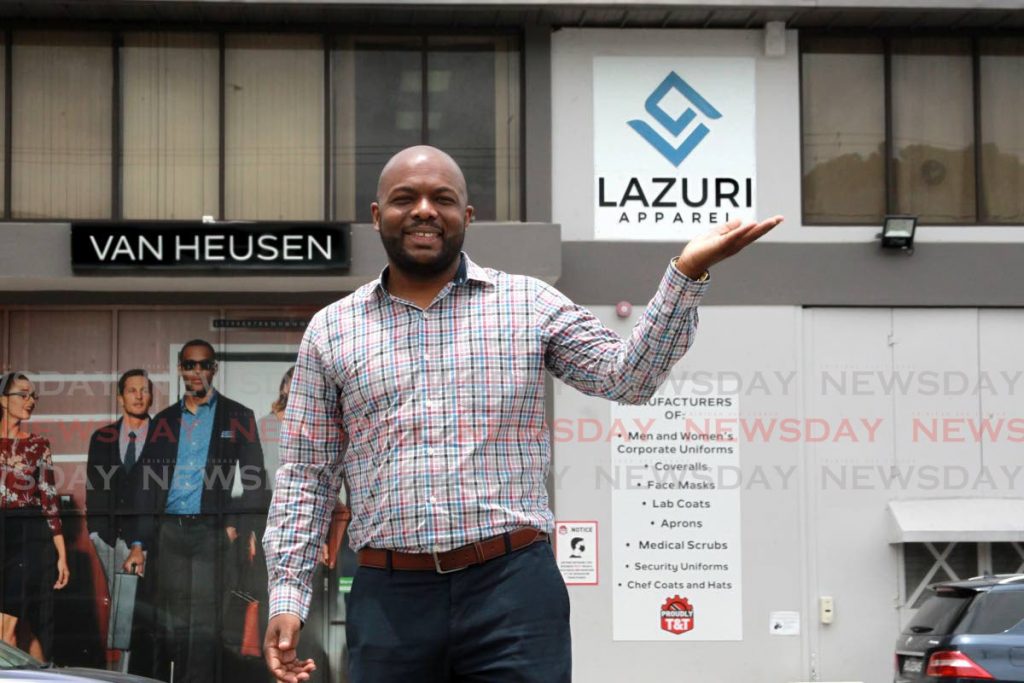
The negative effects of the pandemic and consequent restrictions on the global economy affected businesses the world over and Lazuri wasn’t spared. Roach said its export market almost disappeared making 2020 extremely challenging.
"We are already invested in the garment factory plant. We had bought machinery, we had already hired staff, and we needed to do something with the facility without closing it. There was a growing and immediate demand for face masks. So, we started manufacturing face masks."
He said they have since expanded and started manufacturing branded face masks using sublimation printing for companies and in the last quarter of 2020, they introduced face masks in pouches now sold at major retail outlets stores across TT.
Since then Lazuri has been able to build an inventory, look at new markets while recovering from the millions in losses suffered in 2020.
Refocus, reimagine, and rejuvenate
“Covid19 in a sense was a blessing. In some cases, it allowed us to refine, reposition, and pivot the business to a position where we have an opportunity to rebuild,” Roach said.
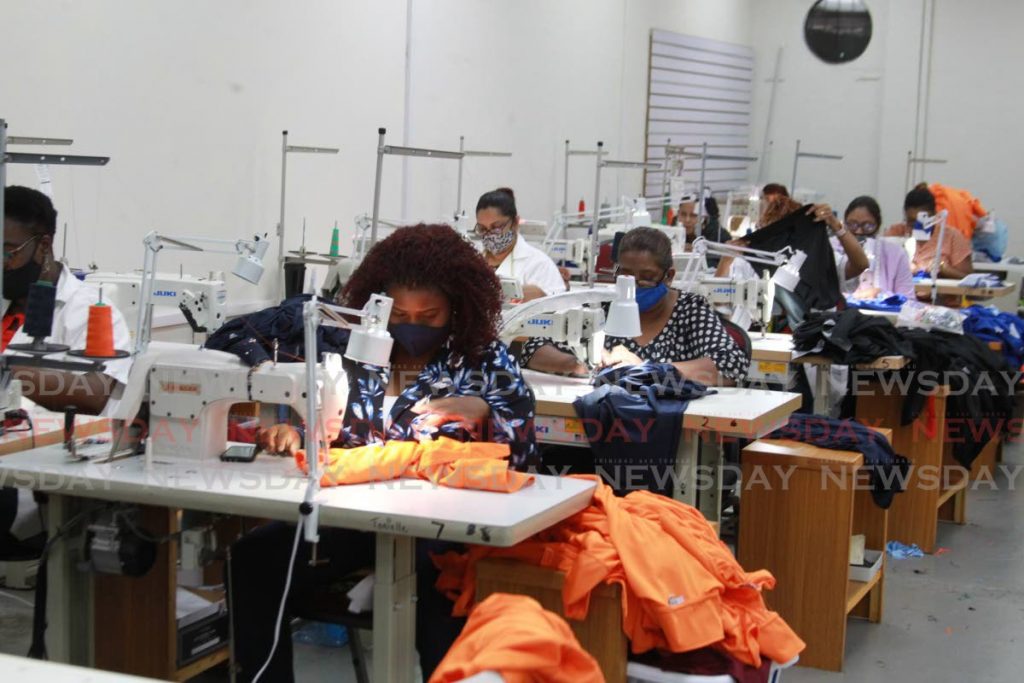
In 2017, Lazuri started with 15 employees; now they have 45. Roach predicts the company will add at least 50 per cent to its production capacity within the next three to six months. He said there are plans to not only hire more people in 2021 but also create an internship programme for young fashion designers, seamstresses, and those interested in gaining experience in the industry.
How is Lazuri growing in a deteriorating business environment? Roach remained optimistic and spotted windows of opportunity with each obstacle.

With the support of his wife, Tricia Roach, who runs the factory, he refocused the business, exited the retail space, and jumped right into wholesale. This brought sustainable growth which allowed Lazuri to expand.
Early 2021, Lazuri saw a niche in manufacturing personal protective equipment, medical scrubs, and industrial workwear, coveralls, industrial shirts, and pants.
"Early this year we decided to go into mass production, and we invested in our polo production line. We made sure we have all the correct machines and equipment to manufacture polo shirts at the highest quality. Why did we do that? We noticed that a lot of dry-fit polos, in particular 99 per cent of them, were being imported into the country. This (manufacturing) saves a lot of foreign exchange. We also created more jobs. And we would have done it and marketed it at a competitive price.”
Lazuri is also manufacturing dry-fit polos with high-visibility tape, useful for workers in the construction industry and businesses with factories using forklift machinery. According to mosterprints.com dry-fit material is a high-performance, microfibre, polyester fabric that moves sweat away from the body and to the fabric surface, where it evaporates.
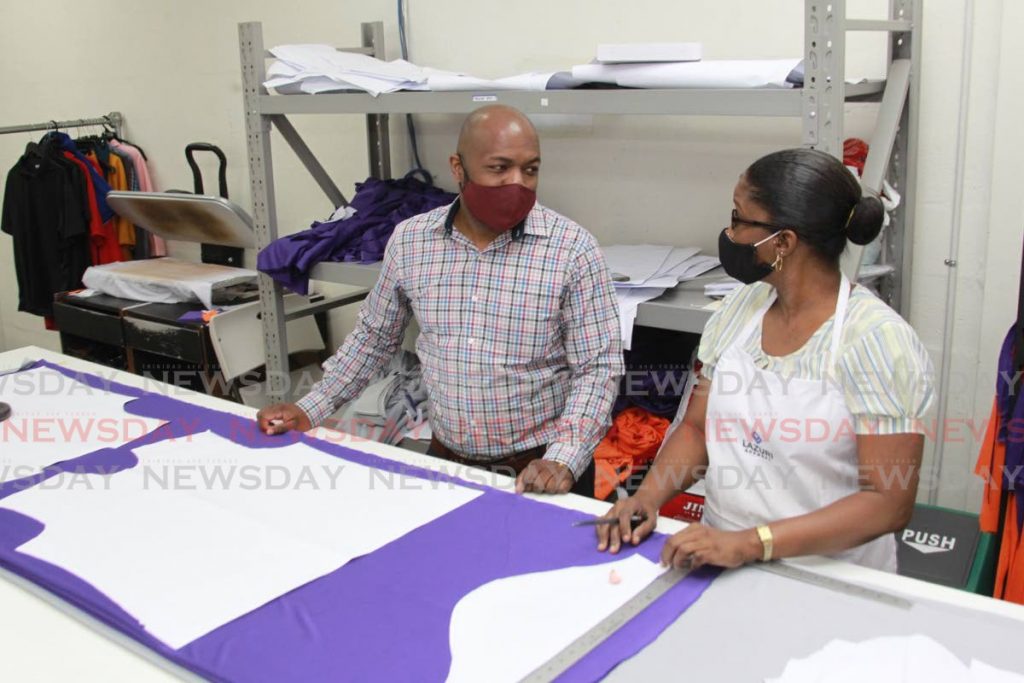
Roach said he expects this item to do extremely well on both the local and export markets.
After the closure of his two Van Heusen outlets, Roach has since found creative ways to cushion the unforgiving blows brought on by restrictions. The Van Heusen line will be available in five JK Signature Styles stores across TT, in a partnership with the retailer.
Start small, think big and then quickly scale-up
In less than five years operating in the garment industry, Roach already feels he has what it takes to move it from being a stagnant sector to one that is viable and competitive on the international market.
“The garment industry has enormous potential. There are many items imported into Trinidad and Tobago, that can be manufactured right here. The industry is somewhat fragmented. And we have been able to structure space with our long-term plan.
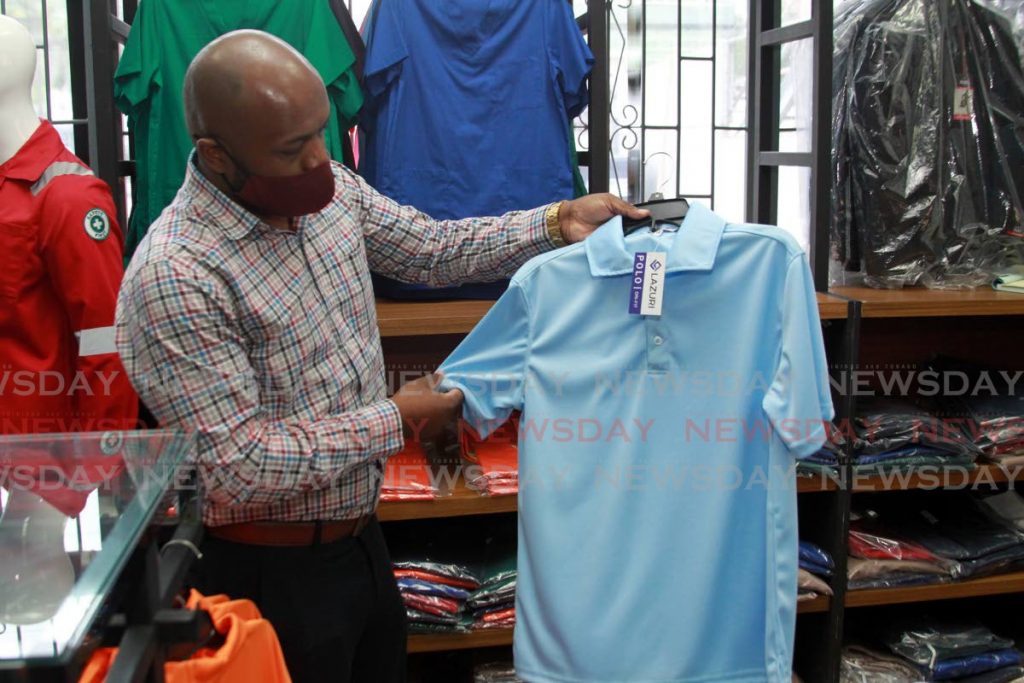
"We can attract the skilled labour to the point where we also have a list of persons waiting to be employed at our facility, as we expand. The future is very simple for us right now, the biggest item we're going to be manufacturing is polo shirts. We started with dry-fit polos, male and female. The next item we are going into would be male/ female cotton polos, poly-cotton polos, and these items are going to be mass-produced for the local unexposed market.
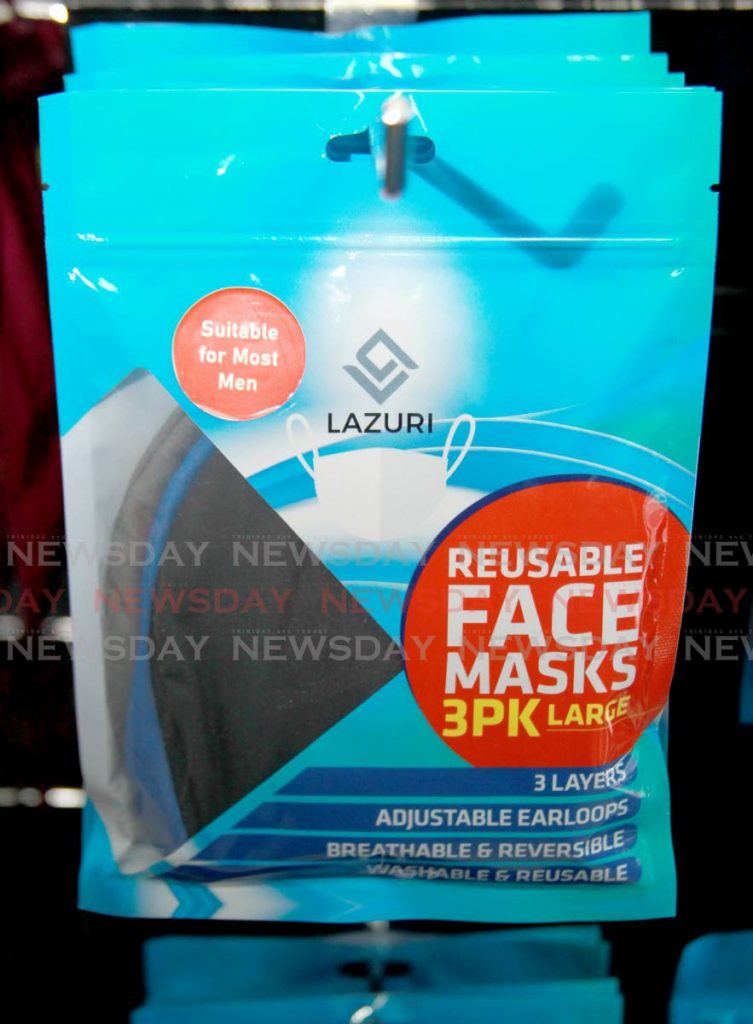
“And then the next step for us will be shirts. So we're going into big categories mass production, huge facility and we expect that within a couple of years we will have to move out of this facility, and go into a much larger facility.
He urged young people, interested in going into the garment manufacturing industry to make “Start small, think big and then quickly scale up” their mantra for guaranteed success.

Comments
"Crossover to PPE saves Lazuri Apparel garment company"